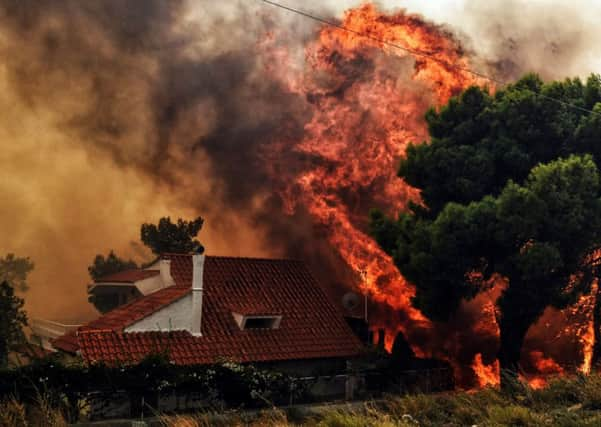Kenny MacAskill: Climate change's threat to humanity is crystal clear


The fun of what was a pleasant surprise is now long wearing off. Working in London must be insufferable for many in a city not designed for it, drought a real issue for communities and even in Scotland sleepless nights are unsettling and the effect on crops is worrying.
That’s as nothing though to the wildfires and destruction around the globe from California to Greece. From great forests to scenic beaches, terror has been unleashed and death and destruction have followed. Watching on television has been bad enough, being there must have been truly horrific. It’s not just the human suffering, there’s also the wildlife killed and endangered.
Advertisement
Hide AdAdvertisement
Hide AdThere’s something primordial about fire that captivates yet terrifies us. Grenfell was horrific and those who caused it must be held to account. But, that was the result of human failings and capable of resolution. What we’re facing now are the effects of global warming that are irreversible and here to stay.
Not just Spain and Portugal hitting record highs but 118 places around the world, from Europe, through America, to Japan. Not all have come with the horror as in Greece but the old and the vulnerable have still died in Japan, unable to cope with the changed environment. And it’s not just here to stay, it’s going to worse.
Long hot summers are the least of our problems. I recall a few years back a cousin in the Western Isles humorously explaining that many on the island lacked suitable clothes when a heatwave struck. Those who holidayed abroad had outfits but others like her neither had them nor could acquire them, as local shops were full of warmer clothing. But, it’s not a whole new wardrobe many are going to need but lifestyle changes that we’ll all have to make, if humanity is to survive.
A recent report in the Proceedings of the National Academy of Sciences suggested warmer summers are here to stay with the pace of temperature rise increasing. That’s bad enough, even if many in Scotland might not begrudge the sunshine remaining. But, as the temperature rises other factors are coming into play for the increased heat has also borne down on places as diverse as Siberia and the Arctic. Methane trapped in the tundra may be released and, as the ice melts, sea levels could rise with potentially calamitous results.
The consequences can’t be fully predicted but the reports are based on authoritative work and it won’t be pleasant or easy to deal with. Nor will it be something that happens somewhere far away, but here and the reality could be grim indeed.
The Gulf Stream is at its weakest in 1,600 years and if that’s lost then temperature change will be more than simply warmer summers and wetter winters. Increased rainfall and higher winds will be the lull before the real storm. It’ll mean significant changes to our weather as that prevailing winds shield us from the worst of our northern location. Anyone in any doubt about what that might mean should simply look at a map and see the latitude we’re situated on, where some major Scandinavian cities are just above us, most Canadian ones are well below us and southern Alaska is parallel.
As a society, we’ll have to adjust to a hugely different climate where the social and economic consequences will be massive and are impossible to quantify. It will mean an entire change to our way of life and almost certainly quality of life in many respects.
But, the wider effects on our world as temperatures and sea levels rise will be horrific, especially for many poor and vulnerable communities. Their lands will burn up before their eyes or disappear beneath their feet, heralding a refugee crisis, the likes of which we’ve never seen. People will need to flee and all the President’s walls and all the Queen’s warships won’t be able to stop them.
Advertisement
Hide AdAdvertisement
Hide AdOver recent years, I was always gobsmacked that many continued to deny climate change, even having a few well-educated friends who saw it simply as a cyclical event. But, now they’ve also recognised what’s happening before their very eyes and can feel what’s beating down on their skin.
Of course, “naysayers” still exist, including President Trump and, sadly, not just his acolytes but people he has placed in critical positions. He hasn’t just sought to undermine global efforts through withdrawal from the Paris Climate Agreement but within his own country with appointments at the Environmental Protection Agency.
Many years ago, I recall speaking to an influential US Republican acquaintance who’s view of global warming was akin to that of the markets on society. There’d be winners and losers according to him, doubtless imagining warmer summers in parts like Scotland and simply regretting the catastrophe that might happen elsewhere.
But, wealth and power cannot insulate you as death and destruction don’t discriminate on those criteria. Floods in Texas and fires in California have shown that wealthy parts suffer and rich folk die, even if greater efforts are made than were after Hurricane Katrina for the poor black communities of New Orleans.
We need to change and change fast. That means governments must take decisions that are hard and probably unpopular but cannot be shirked. They have a duty to lead as they know the potential consequences. Scotland has done moderately well but it’s nowhere near enough. Pledges to work to reduce emissions aren’t enough. Concrete actions are needed.
It will affect us all and how we live. Unrestricted car usage and cheap flights may well become things from a bygone age. It won’t be easy to reconfigure our society but it must be done, if we want humanity to continue to exist.